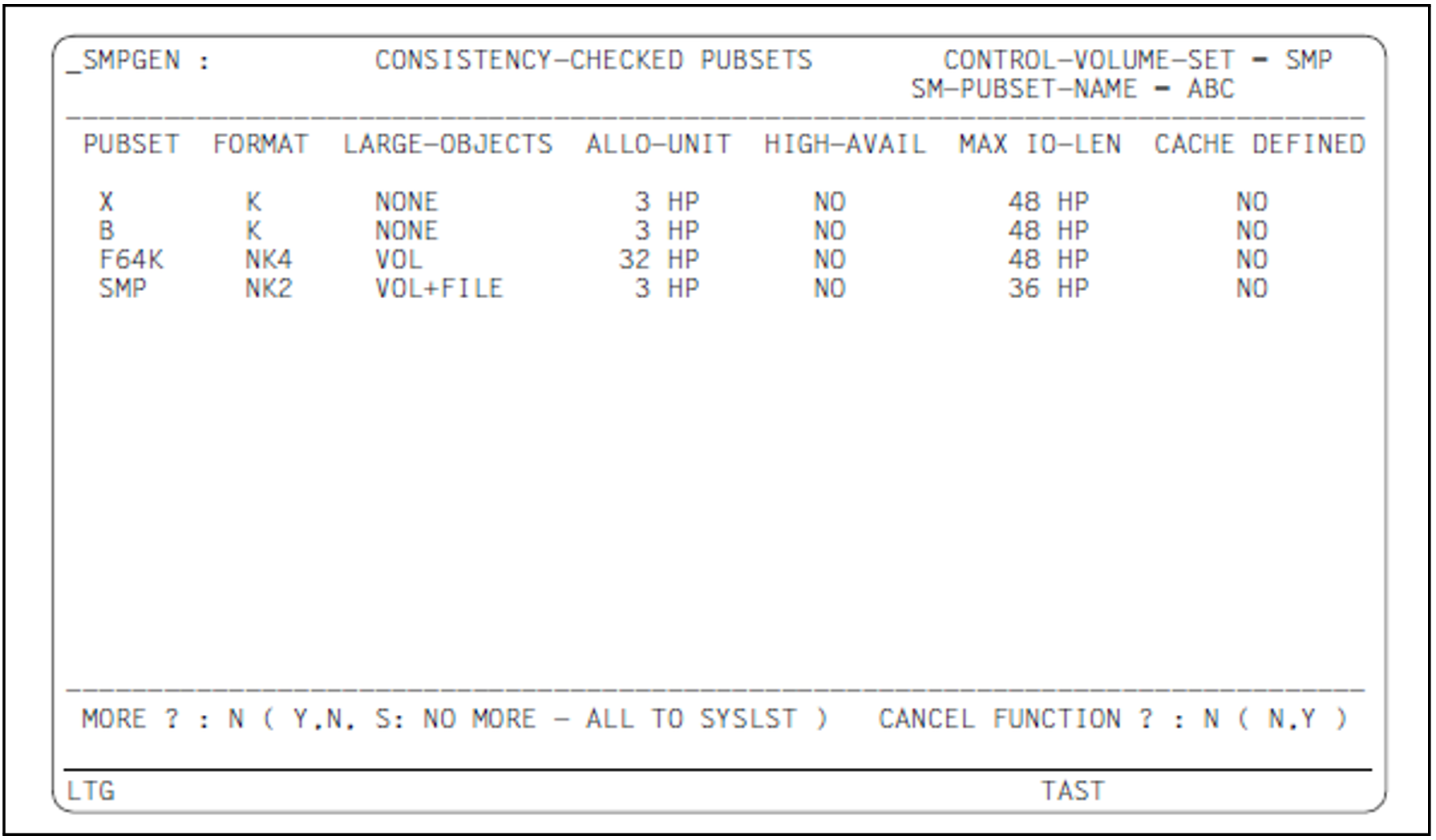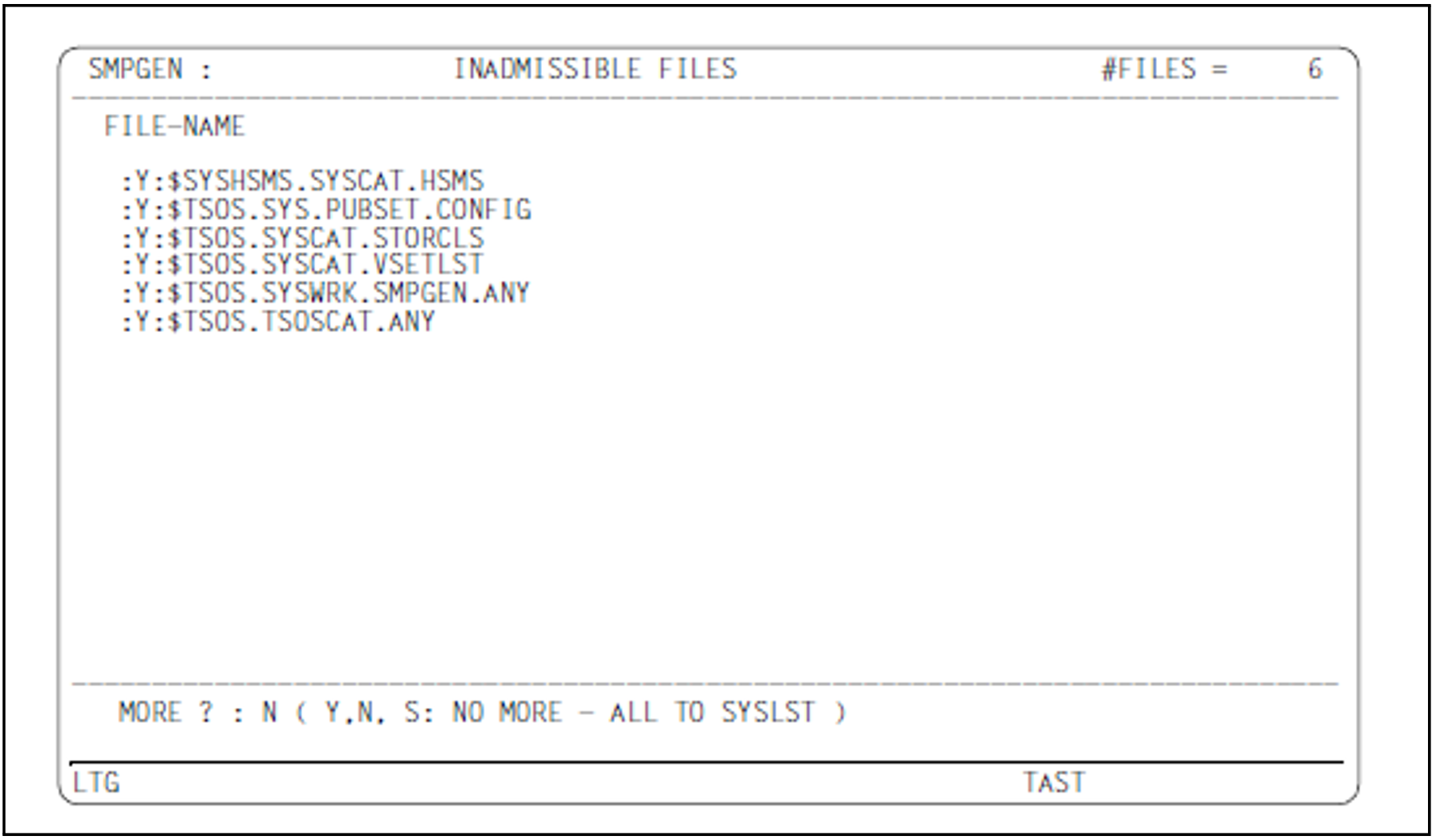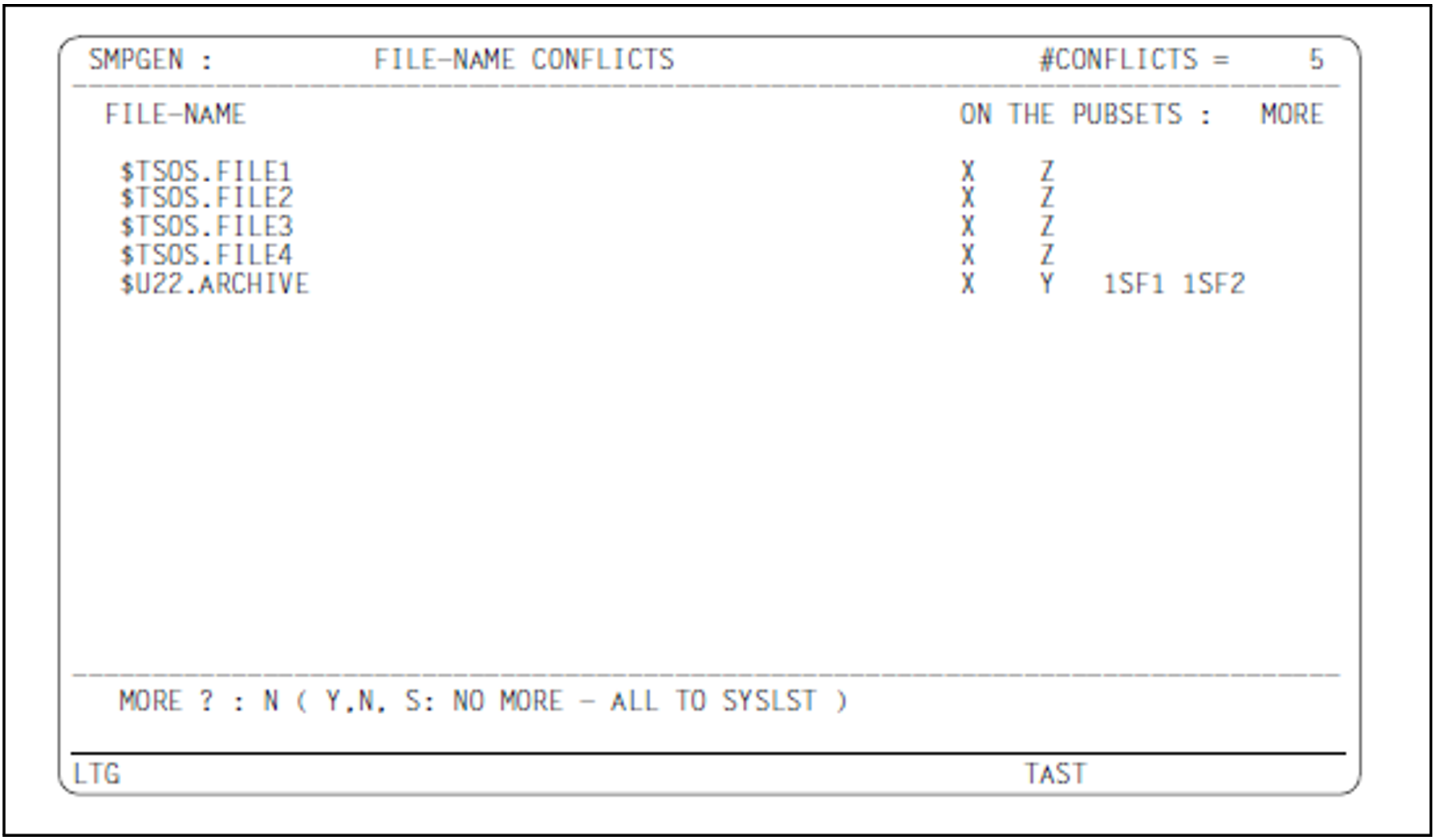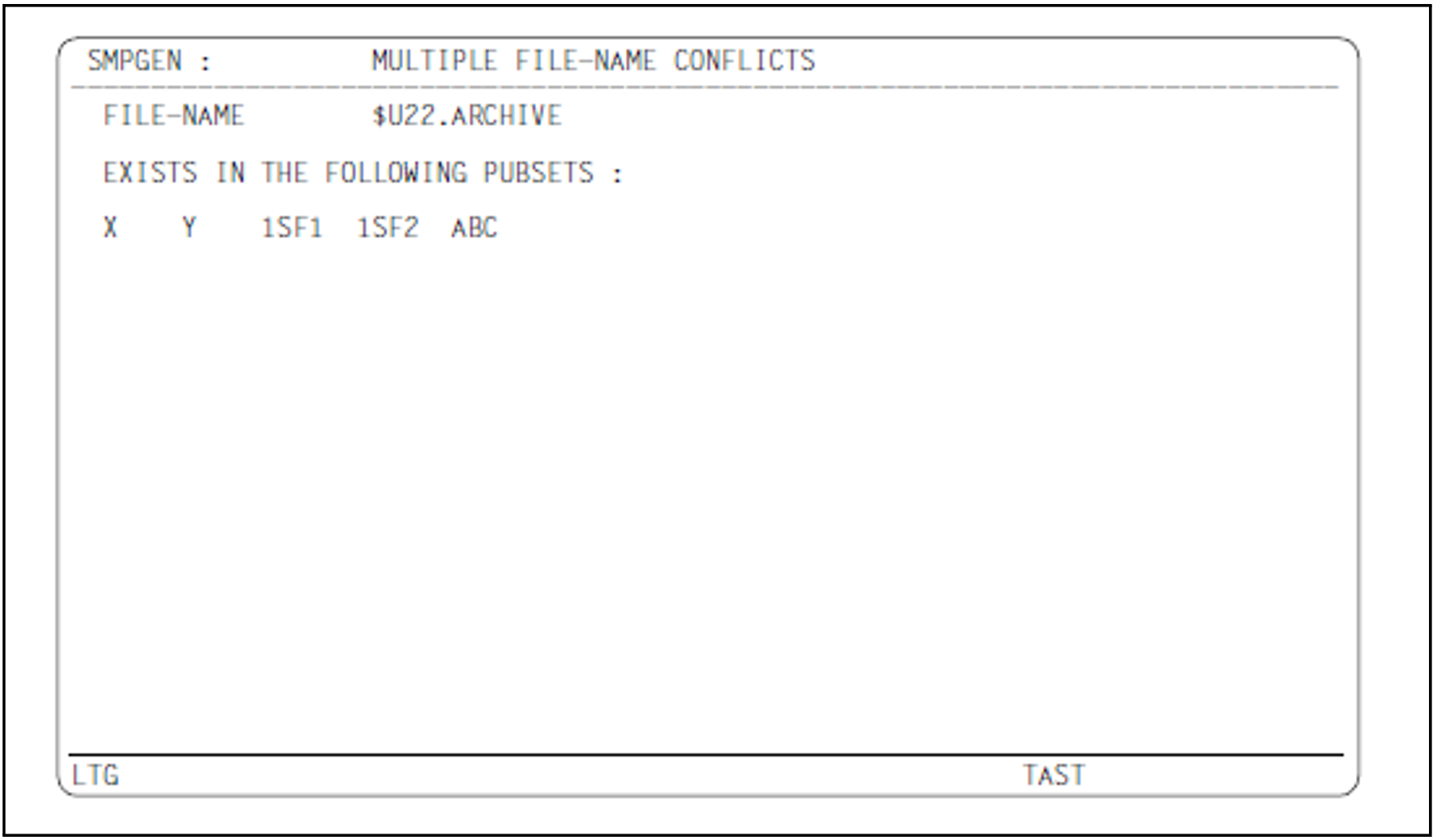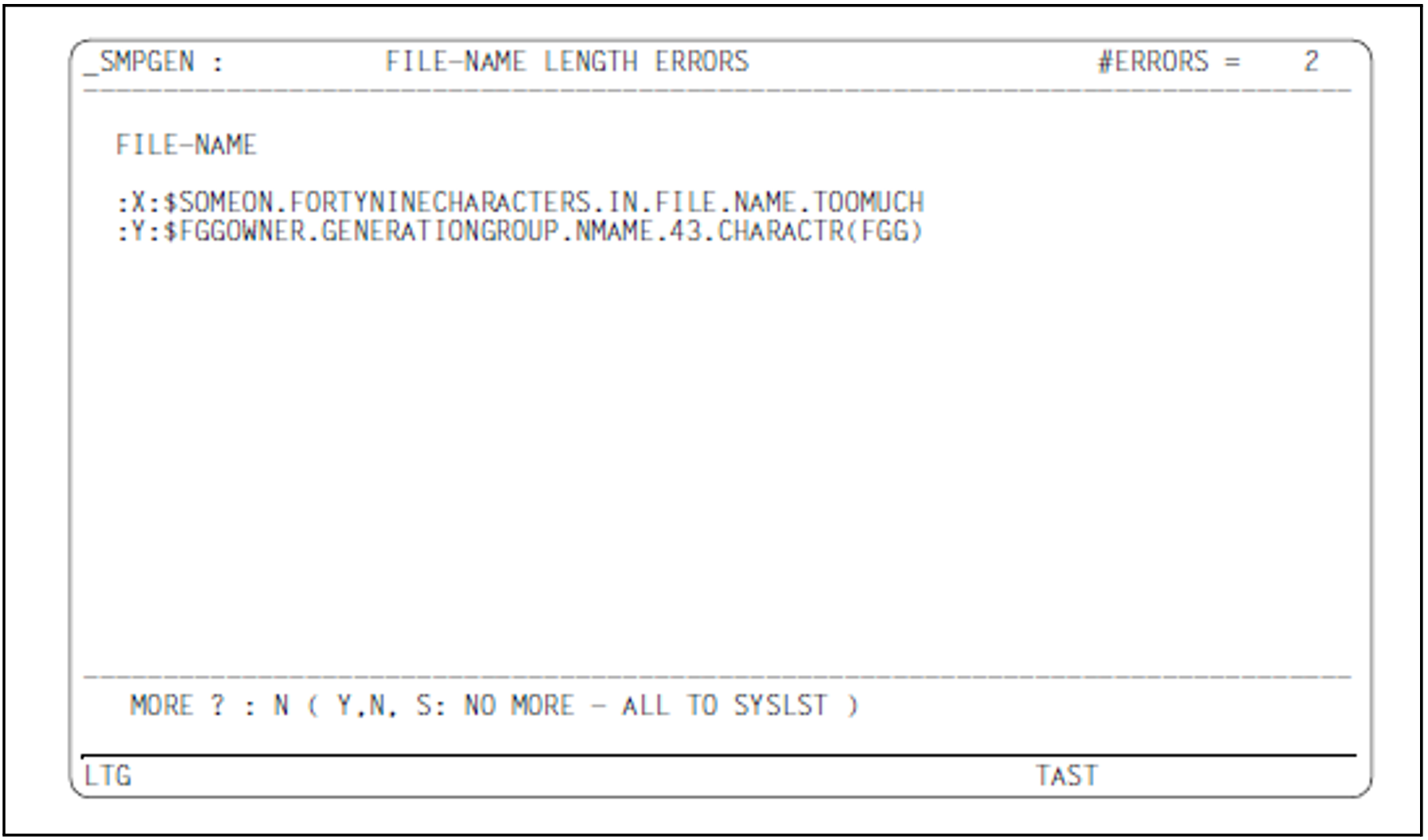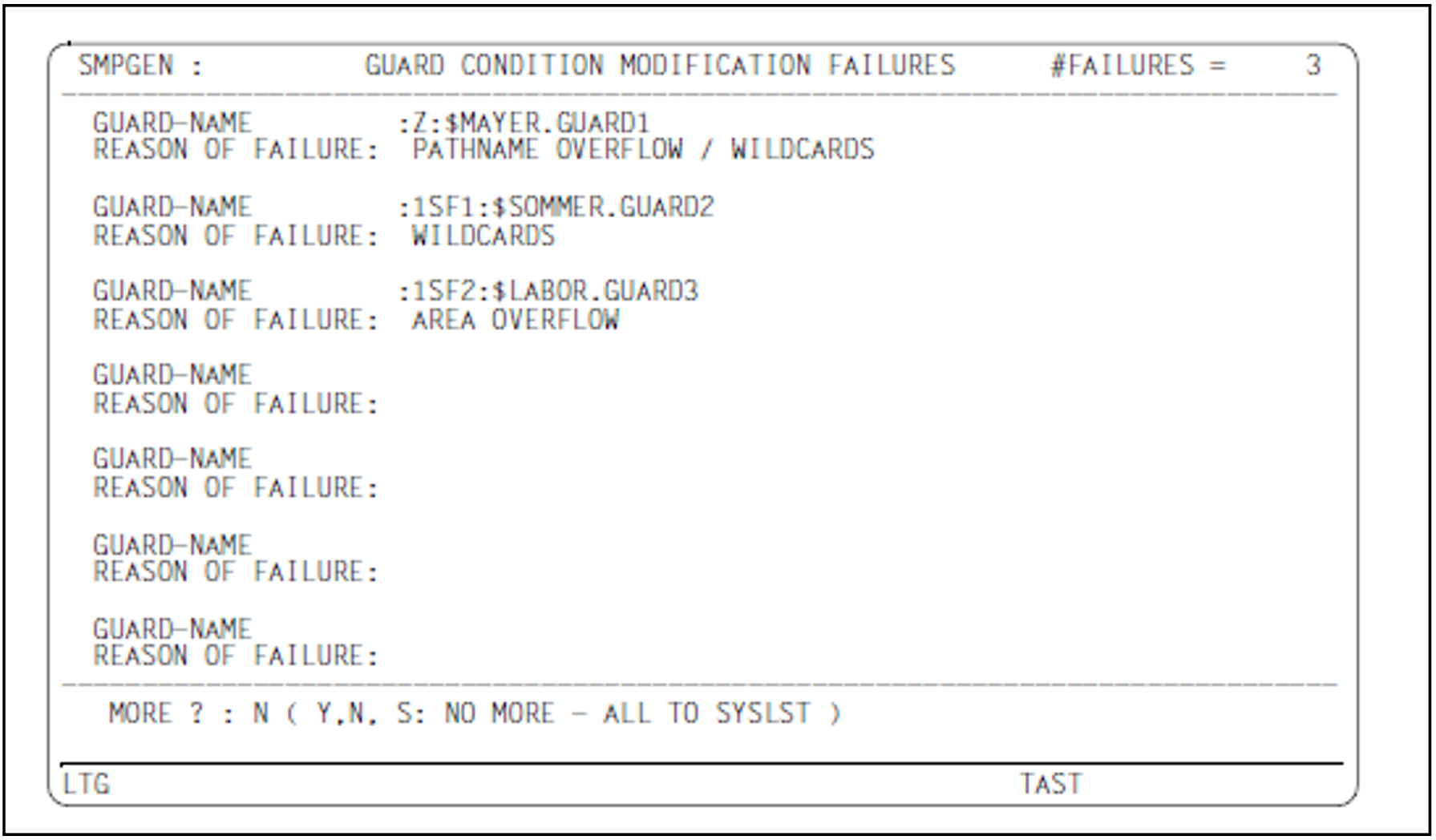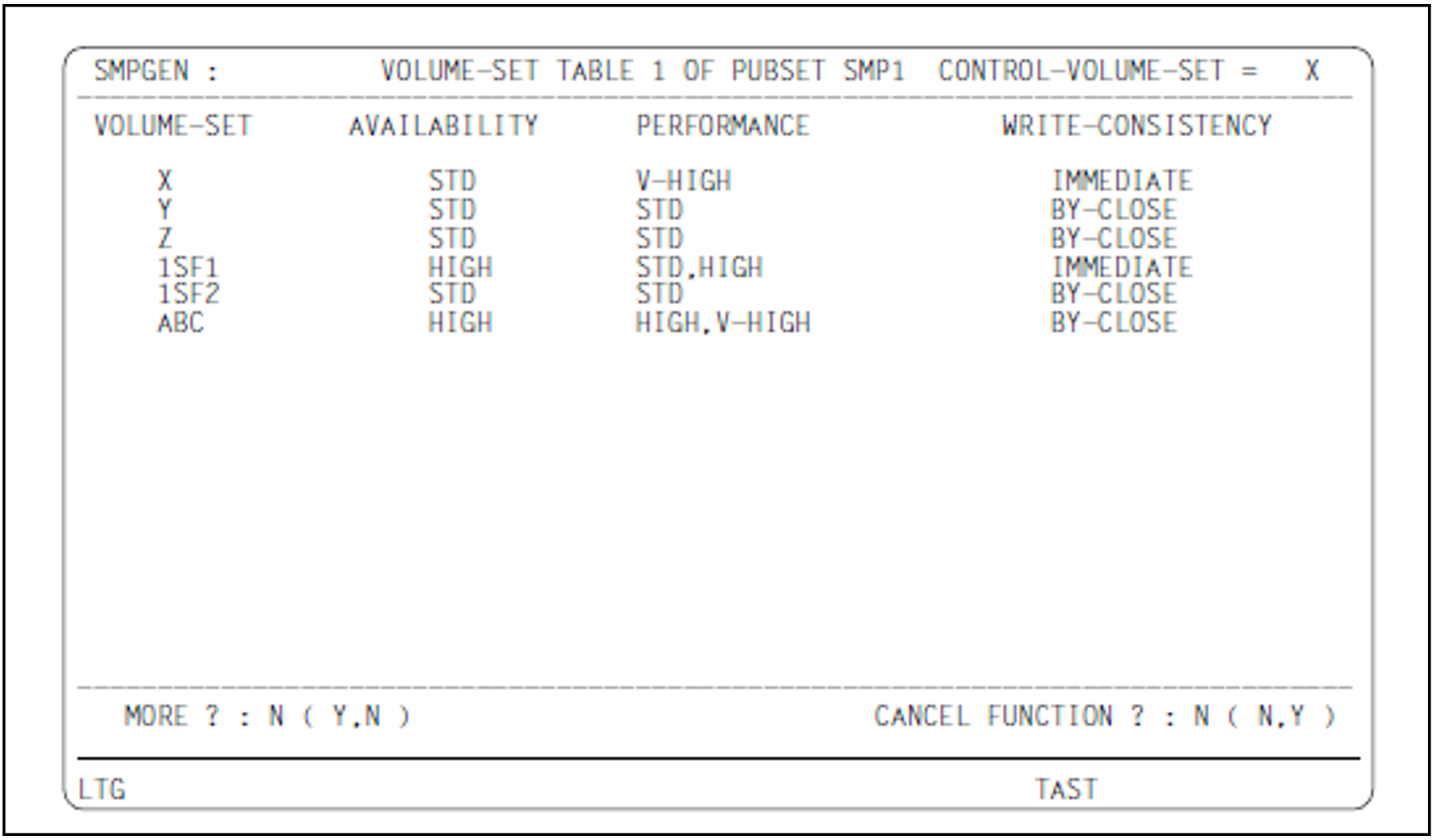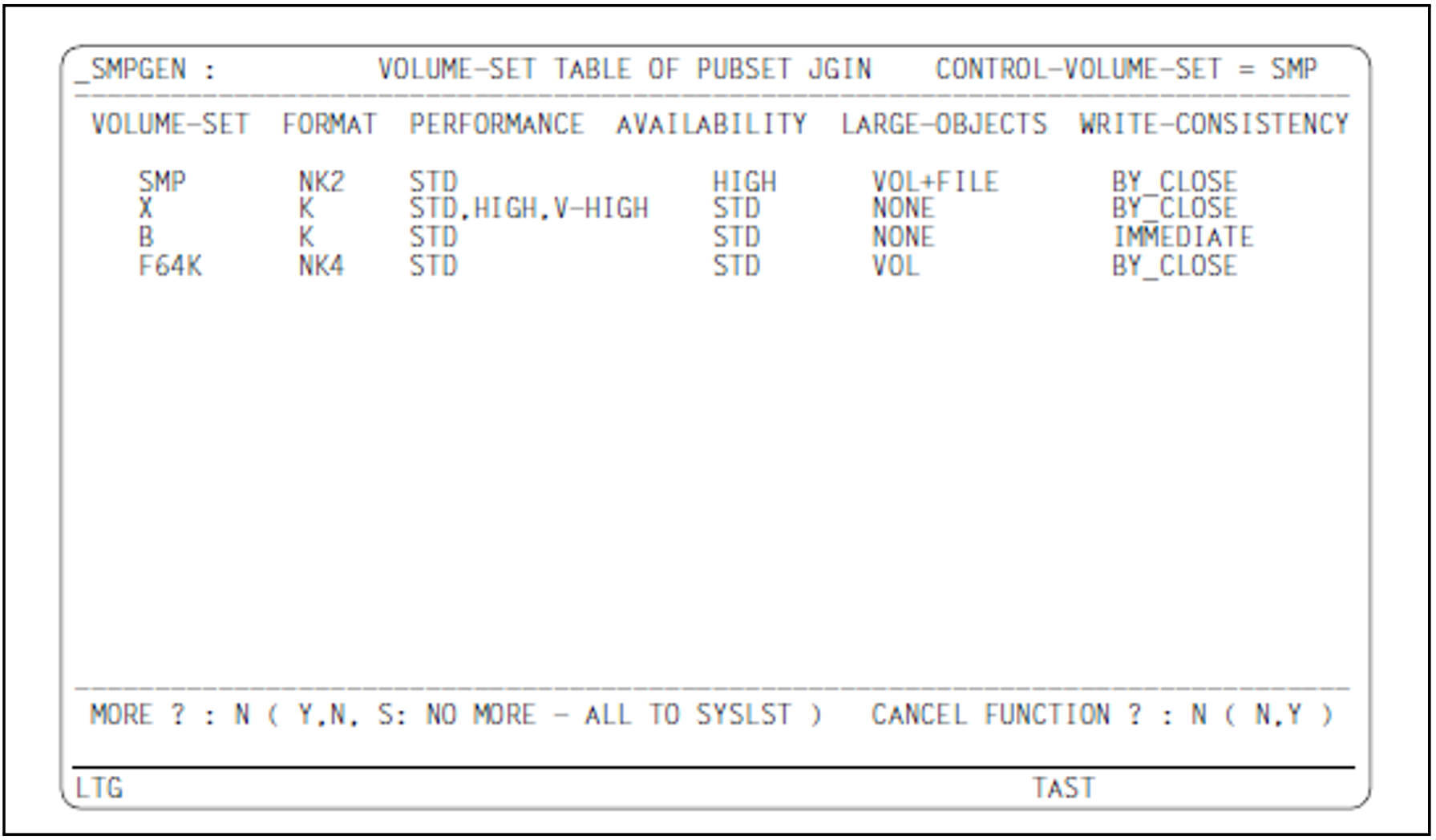The screen masks are made up of 80 columns and 24 lines, and have the following structure:
Header with title
Data section for output of object attributes (output fields)
The output fields are supplied with the appropriate values by SMPGEN. They cannot be overwritten by the user.
Exceptions are the fields “MORE” in masks 3, 5 and 7, for which inputs are possible.Footer with input option (e.g. change the output medium)
When outputting to SYSLST, or when executing batch tasks, the footer is omitted. In this case, the output is always complete (equivalent to the input MORE=Y for output to the terminal).
The character in line 1, column 1 (support of the local hardcopy function) can be overwritten in order to position the cursor on it.
To continue the program run, press the DUE key on the terminal. The K1, K2 and K3 keys are ignored.
The following masks are available:
CONSISTENCY-CHECKED PUBSETS
INADMISSIBLE FILES
FILE-NAME CONFLICTS
MULTIPLE FILE-NAME CONFLICTS
JV-NAME CONFLICTS
MULTIPLE JV-NAME CONFLICTS
GUARD-NAME CONFLICTS
MULTIPLE GUARD-NAME CONFLICTS
FILE-NAME LENGTH ERRORS
JV-NAME LENGTH ERRORS
GUARD CONDITION MODIFICATION FAILURES
VOLUME-SET TABLE 1
VOLUME-SET TABLE
MASK 1: CONSISTENCY-CHECKED PUBSETS
This mask is generated with the CREATE- and MODIFY-SYSTEM-MANAGED-PUBSET statements when performing only the check function or when the CHECK-NAME-CONSISTENCY statement is executed.
HEADER
CONTROL-VOLUME-SET
Pubset ID input for the operand of the same name;
*NONE is shown as *NON
SM-PUBSET-NAME
SM pubset ID entered via an operand
DATA
PUBSET
Pubset ID of the checked pubset
FORMAT
Disk format determined: K / NK2 / NK4
LARGE-OBJECTS
Indicates whether volumes or files that are larger than 32 Gbytes are permitted:
VOL+FILE: | Volumes and files that are larger than 32 Gbytes are permitted |
VOL: | Only volumes that are larger than 32 Gbytes are permitted |
NONE: | Neither volumes nor files that are larger than 32 Gbytes are permitted |
ALLOCATION-UNIT
Allocation unit in half pages (2KB each)
HIGH-AVAIL
Enhanced availability: YES (DRV operation, RAID etc.) / NO
MAXIMAL IO-LENGTH
Maximum transfer length for disk input/output
CACHE DEFINED
Has a cache medium been defined?: YES / NO
FOOTER
MORE
This field is preset to “Y” if more pubsets than specified in the current statement are checked than are shown on the current and previous screen pages.
Overwriting this field with “N” prevents output of further pubsets at the terminal.Overwriting this field with “S” means that no further pubsets are output to the terminal but the complete pubset information is output to SYSLST independent of the OUTPUT parameters.
CANCEL FUNCTION
This field is preset to “N”. If overwritten with another value, the function is aborted.
MASK 2: INADMISSIBLE FILES
This mask is generated for privileged users of SMPGEN when illegal files are present in the pubsets to be checked.
These are the files referred to in the description of the check function, which cannot be used in the SM pubset.
They must not be cataloged in the pubsets, because SMPGEN sets up work files or new administration files under these names, or because the files cannot be used as paging files in the SM pubset.
HEADER
#FILES
Number of illegal files
DATA
FILE-NAME
Path name
FOOTER
MORE
This field is preset to “Y” if more files are present than are shown on the current and previous screen pages.
Overwriting this field with “N” prevents output of further pubsets at the terminal. Overwriting this field with “S” means that no further file names are output to the terminal but that all the illegal files are listed, independent of the TEXT-OUTPUT operand. Other outputs are continued as normal.
MASK 3: FILE-NAME CONFLICTS
This mask is created if file name conflicts arise. If file names occur on more that four pubsets, a full pubset screen is output for each of the file names immediately after this screen (mask 4), unless otherwise defined by the user in the overwrite field on the right margin.
The next screen to output file name conflicts, mask 3, is not displayed until this operation has been completed.
HEADER
#CONFLICTS
Number of files that are cataloged on several of the checked pubsets
DATA
FILE-NAME
File name without catalog ID
ON THE PUBSETS
Catalog ID of relevant pubset
MORE
This field is preset to “Y” if the name exists on more that four pubsets, otherwise blank. Overwriting this field with “N” or blanks prevents mask 4 being output at the terminal. Overwriting this field with “S” means that mask 4 is no longer output to the terminal, but to SYSLST, regardless of what is specified for the TEXT-OUTPUT operand.
FOOTER
MORE
This field is preset to “Y” if more file name conflicts are present than are shown on the current and previous screen pages.
Overwriting this field with “N” prevents output of further file names at the terminal and to SYSLST.
Overwriting this field with “S” means that no further file names are output to the terminal but that all the file name conflicts are output to SYSLST, independent of the TEXT-OUTPUT operand. Other outputs are continued as normal.
MASK 4: MULTIPLE FILE-NAME CONFLICTS
This mask is generated when file names occur on more than four pubsets. It is output after mask 3 for each file name marked there with MORE=Y if the field was not overwritten with “N”.
The pubsets already displayed in mask 3 are also output. Inputs are not possible.
DATA
FILE-NAME
File name without catalog ID
EXISTS IN THE FOLLOWING PUBSETS
Pubset IDs of the particular pubset
MASK 5: JV NAME CONFLICTS
The structure, meaning and reaction options of this mask are analogous to those of mask 3, with the exception that conflicts among the names of job variables are considered here.
MASK 6: MULTIPLE JV NAME CONFLICTS
The structure, meaning and reaction options of this mask are analogous to those of mask 4, with the exception that conflicts among the names of job variables are considered here.
MASK 7: GUARD-NAME CONFLICTS
The structure, meaning and reaction options of this mask are analogous to those of mask 3, with the exception that conflicts among the guard names are considered here. A connecting line consisting of periods bridges the space between guard names and pubsets affected.
MASK 8: MULTIPLE GUARD-NAME CONFLICTS
The structure, meaning and reaction options of this mask are analogous to those of mask 4, with the exception that conflicts among the guard names are considered here.
MASK 9: FILE-NAME LENGTH ERRORS
This mask is generated when file names are encountered which exceed the maximum permissible file name length of 54 characters when replacing the old pubset ID with a new one (PUBSET-ID-LENGTH, or for which the file generation group names are longer than 47 characters. The individual file generations are not displayed separately.
HEADER
#ERRORS
Number of file names that exceed the permissible length.
Path names that differ only with respect to the catalog ID are treated as different file names.
DATA
FILE-NAME
Path name (with catalog ID); for file generation group names followed by the generation number
FOOTER
MORE
This field is preset to “Y”, if more files are affected than are shown on the current and previous screen pages.
Overwriting this field with “N” prevents output of further warnings of this type at the terminal.
Overwriting this field with “S” means that no further file names are output to the terminal but that all the file names that are too long are output to SYSLST, independent of the TEXT-OUTPUT operand. Other outputs are continued as normal.
MASK 10: JV-NAME LENGTH ERRORS
Just like mask 9, except that the job variable names are listed here.
MASK 11: GUARD CONDITION MODIFICATION FAILURES
This mask is generated when guard condition errors are encountered, i.e. when program names in guard conditions could not be matched to the new pubset ID. Possible causes:
the program name contains wildcards
the program name would be longer than 54 characters
the guard condition section would be too long (= area overflow)
HEADER
#FAILURES
Number of guard condition failures
DATA
GUARD-NAME
Path name of guard affected
REASON OF FAILURE
Cause or list of causes: WILDCARDS or PATHNAME OVERFLOW or AREA OVERFLOW or any combination of these three causes.
FOOTER
MORE
This field is preset to “Y” if more guards condition failures have occurred than are shown on the current and previous screen pages.
Overwriting this field with “N” prevents output of further warnings of this type at the terminal.
Overwriting this field with “S” means that no further warnings of this type are output to the terminal but all warnings of this type are output to SYSLST, independent of the TEXT-OUTPUT operand. Other outputs are continued as normal.
MASK 12: VOLUME-SET TABLE 1
This mask is generated for the CREATE-/MODIFY-SYSTEM-MANAGED-PUBSET statement if the call comes from an interactive task. This table is output to SYSOUT independent of the OUTPUT operand so that the inputs can be checked once again before the statement is executed. The footer can be used to abort the function.
HEADER
PUBSET
Catalog ID of the SM pubset to be created or extended
CONTROL-VOLUME-SET
The specified pubset ID for the operand of the same name when creating an SM pubset or the volume set ID of the control volume set when extending an SM pubset.
*NONE is shown as *NON
DATA
VOLUME-SET
ID of the volume set to be set up (previously SF pubset ID)
AVAILABILITY
Operand value of the ADD-VOLUME-SET suboperand of the same name
PERFORMANCE
Operand value of the ADD-VOLUME-SET suboperand of the same name.
Format: STD / HIGH / STD, HIGH / V-HIGH / HIGH, V-HIGH / STD, HIGH, V-HIGH
WRITE-CONSISTENCY
Operand value of the WRITE-CONSISTENCY suboperand of the ADD-VOLUME-SET operand
FOOTER
MORE
This field is preset to “Y” if more volume sets belong or are added to the SM pubset that is to be created or extended than are shown on the current and previous screen pages. Overwriting this field with “N” prevents output of further volume sets at the terminal. Other outputs are continued as normal.
CANCEL FUNCTION
This field is preset to “N”. If overwritten with another value, the function is aborted.
MASK 13: VOLUME-SET TABLE
This mask is generated for the CREATE-/MODIFY-SYSTEM-MANAGED-PUBSET statement - if not just a check function is being performed.
HEADER
CONTROL-VOLUME-SET
The specified pubset ID for the operand of the same name when creating an SM pubset or the volume set ID of the control volume set when extending an SM pubset.
*NONE is shown as *NON
PUBSET
Catalog ID of the SM pubset to be created or extended
DATA
VOLUME-SET
ID of the volume set to be created (=previously SF pubset ID)
FORMAT
Disk format determined: K / NK2 / NK4
AVAILABILITY
Operand value of the ADD-VOLUME-SET suboperand of the same name
LARGE-OBJECTS
Indicates whether volumes or files that are larger than 32 Gbytes are permitted:
VOL+FILE: | Volumes and files that are larger than 32 Gbytes are permitted |
VOL: | Only volumes that are larger than 32 Gbytes are permitted |
NONE: | Neither volumes nor files that are larger than 32 Gbytes are permitted |
PERFORMANCE
Operand value of the ADD-VOLUME-SET suboperand of the same name.
Format: STD / HIGH / STD, HIGH / V-HIGH / HIGH, V-HIGH / STD, HIGH, V-HIGH
WRITE-CONSISTENCY
Operand value of the WRITE-CONSISTENCY suboperand of the ADD-VOLUME-SET operand
FOOTER
MORE
This field is preset to “Y” if more volume sets belong to the SM pubset that is to be created or extended than are shown on the current and previous screen pages.Overwriting this field with “N” prevents output of further volume sets at the terminal.Overwriting this field with “S” means that no further volume sets are output to the terminal but the complete volume set list is output to SYSLST regardless of what is specified for the OUTPUT operand. Other outputs are continued as normal.
CANCEL FUNCTION
This field is preset to “N”. If overwritten with another value, the function is aborted.

